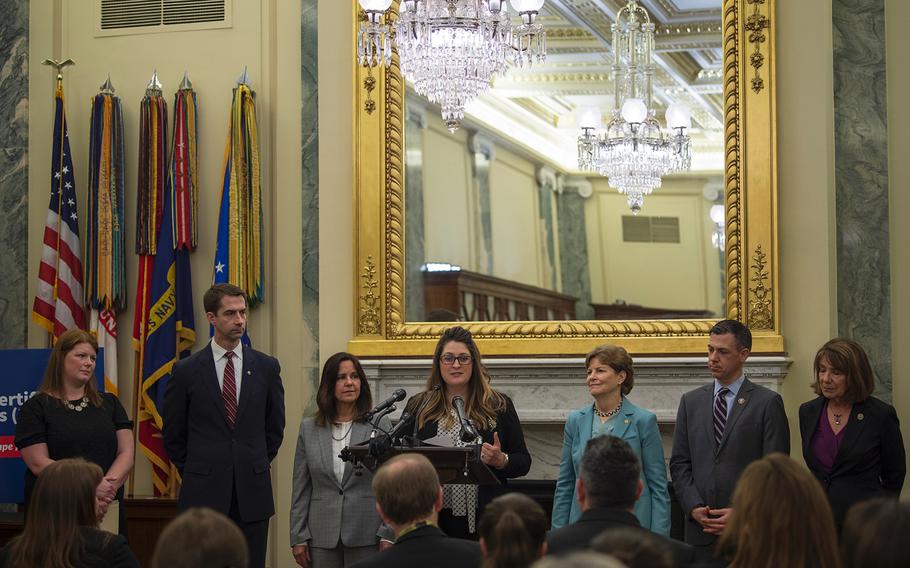
Air Force spouse Brittany Boccher speaks in the Russell Senate Building on Capitol Hill in Washington on Thursday, May 9, 2019. Joining Boccher in promoting efforts to make it easier for military spouses' occupational licenses to be portable from state to state are from left: Navy spouse Andrea Krull; Sen. Tom Cotton, R-Ark; second lady Karen Pence, wife of Vice President Mike Pence; Sen. Jeanne Shaheen, D-N.H; Rep. Jim Banks, R-Ind; and Rep. Susan Davis, D-Calif. (Carlos Bongioanni/Stars and Stripes)
WASHINGTON – Andrea Krull has moved eight times since she married into the military.
And each time, she is forced to restart her business as a public relations consultant, navigating a new set of state and local regulations to re-establish her firm.
Krull, and her husband Matthew, an active-duty Navy officer, move every 12 to 36 months.
“The downside to that is it’s really difficult to maintain a career when you are constantly moving,” Andrea Krull said Thursday at a Capitol Hill event to laud new legislation to address such issues. “Unemployment and underemployment is a chronic problem that impacts the military spouse community.”
Now, Krull is hoping the new legislation being spearheaded by several Republican and Democratic members of the Senate and House Armed Services Committees will be the answer. On Thursday, she joined other military spouses, Second Lady Karen Pence, Sens. Jeanne Shaheen, D-N.H., and Tom Cotton, R-Ark., and Reps. Susan Davis, D-Calif., and Jim Banks, R-Ind., to introduce new legislation that they contend will help military spouses forced to relocate to find better job and career opportunities.
Their Portable Certification of Spouses Act looks to ease obstacles when it comes to relocating small businesses and pursuit of work opportunities despite the daunting number of moves that come with being part of a military family.
The PCS Act, its name a play on the popular acronym for servicemembers when they undergo a Permanent Change of Station move, focuses on easing burdens for military spouses who are owners of small companies and others in careers that require licensing.
For example, the legislation would let spouses enjoy the same opportunities as servicemembers to retain their state of residency when they relocate, helping to make smoother work transitions and eliminate some paperwork. The legislation also aims to standardize licensing requirements across states and could cover teachers, nurses, dentists, counselors, social workers, veterinarians, real estate agents and others.
“Military spouse employment is a very important aspect of a strong and resilient military family,” Pence said. “We know that if spouses aren’t happy, then servicemembers are going to get out of the military sooner and we don’t want that to happen.”
Pence said she has met directly with some military spouses to learn about their struggles to maintain work, noting they experience a 24% jobless rate. Next week, Pence plans to host 46 businesses to ask their help in addressing the high unemployment rate.
The lawmakers said they hope the proposal will be part of upcoming talks to draw up the next National Defense Authorization Act, the annual legislation that sets policy and spending plans for the military. It would direct new funding to the Department of Defense to support the licensing effort by paying for interstate agreements that can cost $500,000 each.
The legislation will “cut red tape for military spouses and ensure they can pursue a career even while they are following their military spouse from state to state and base to base,” Cotton said.
One in three military spouses work in careers that require an occupational license and too many of them are forced to recertify as they move, he said.
Shaheen said her office had been working on a solution for military spouses after hearing from the Krulls. And when her office then heard Cotton was working on a plan as well, they joined forces nine months ago to put together the proposal.
“Military spouses often bear most of the burden of moving their families, establishing themselves in new communities and then picking up in a couple of years,” Shaheen said. “They are wholeheartedly devoted to the mission, that’s why whenever we can find ways to support military spouses, we should act.”
grisales.claudia@stripes.com Twitter: @cgrisales